Kill Bill: Volume 2 (2004)
Directed by: Quentin Tarantino
Written by: Quentin Tarantino
Starring: Daryl Hannah, David Carradine, Michael Madsen, Uma Thurman
HCF REWIND NO. 140: KILL BILL: VOLUME 2 [2004]
AVAILABLE ON DVD AND BLU-RAY
RUNNING TIME: 137 min
REVIEWED BY: Dr Lenera, Official HCF Critic
The Bride has killed two of the five people on her list and is now seeking out the remaining three. We learn that Bill ordered the other members of the Deadly Assassination Squad to kill the Bride because she had retired from assassination and left Bill in order to give a better life to her unborn daughter. Bill was the child’s father, but the Bride had fallen in love with someone else and was about to marry him when the ceremony was rudely interrupted. Now, she is after Bill, Elle Driver and Bill’s brother Budd, but Budd is ready for her and buries her alive….
Now this is where, to be honest, it gets strange. We all know, or have been told, that some way through production of Kill Bill the decision was made to split it into two films. However, considering that this second part is quite different from the first part, I find it hard to believe that it was ever intended as one long film. I’m certainly not calling Tarantino and others liars. He may well have found a way to make it work , and actually two years ago Kill Bill: The Whole Bloody Affair, which made the two films into one with some editing out of some footage at the end of the first one and start of the second to smooth things over, was shown in some cinemas, though is still fustratingly unavailable for home viewing. I just find it odd though. Consider that while the first film may have a few longuers where Tarantino is trying to make it more his own, the second one is much more dialogue-heavy and slow throughout. It’s also far less stylised. I was immensely disappointed with it at the cinema. For a start, why the hell was there only a few minutes worth of fighting, compared to the huge amount in the first film? Upon viewing Kill Bill: Volume 2 again, there is actually quite a lot to like, and actually the fact that it is far more a Tarantino movie through and through means it is actually less uneven than its predecessor. It’s far less entertaining though, and gets rather lost towards the end.
So one film became two, and Tarantino had shot most of Kill Bill: Volume 2 by the way time the first episode was released. Fight choreographer Woo-ping Yuen was originally set to play Pai Mei but could not fit it in with his choreography, so Gordon Liu, who had been in the first film, played the role. Tarantino kept altering the script up to the last possible minute. One whole new chapter, Massacre At Two Pines, was written and filmed to partially replace the removal of Yuki’s Revenge from the script, where Gogo’s sister would have been after The Bride, while a scene where Bill fights some people was filmed but not used. Though Tarantino said it would not have fit anywhere, I think it should have been in the film, because we would have seen Bill’s fighting prowess, something we otherwise just hear about. The final confrontation between Bill and The Bride originally took place on a beach, but the production was overrunning so producer Harvey Weinstein, in a rare case of him getting Tarantino to alter something, asked the director to keep the entire climax in Bill’s house. The film was even more commercially successful than the first and Uma Thurman and David Carradine received Golden Globe nominations. Thurman should actually have got an Oscar, but more on that later.
Again we are treated to loads of film and TV references, though not quite as much as in part one and this film doesn’t feel so much like it’s made up of bits and pieces from other movies. Yes, the Bride limps off into the desert in a shot just like the final one of The Searchers, then walks through the desert barefoot like David Carradine’s character in the Kung Fu TV series, Carradine plays the same flute he did in The Silent Flute, The Bride [who we’ll now call Beatrix as its revealed in the film] is buried alive but manages to dig herself out just like the hero of Django Kill, the Pai Mei character was a real person and is a recurring character in many kung fu movies dealing with the Shaolin Temple, his three inch punch is like Bruce Lee’s, and so forth, but some of this stuff doesn’t stick out as much as before. Though there are certainly martial arts elements, there is more of a spaghetti western feel to much of this film with its desert locations and much usage of tunes from films by Sergio Leone, Sergio Corbucci and others, including a great deal of Ennio Morricone. This Morricone fan didn’t enjoy hearing his fabulous music over scenes for which it wasn’t originally intended, but I guess it’s just me – some love Tarantino’s use of music, and some don’t. If you asked me does it work for the films, I would say yes, for the most part, though that doesn’t mean I like it!
This is a much more leisurely endeavour than part one. The first chapter, which is in black and white and shows us the lead-up to the shooting of Beatrix that opens the whole saga, is a lengthy conversation between various people in a church, and the actual massacre isn’t shown. The next chapter introduces us properly to Beatrix’s next target Budd, who is basically Michael Madsen playing Michael Madsen with more of a moral code, and we spend quite a bit of time hanging around with him before Beatrix turns up. Sadly, Tarantino’s dialogue is rarely near his best and much of it just seems like padding. I recently re-watched Django Unchained, and though there are a great many scenes with an extremely slow rhythm where folks just talk, I’m not sure I would want to sacrifice any of it, because it’s all so bloody good. With this film though, much of it just seems like unnecessary padding of what is supposed to be a ‘roaring rampage of revenge’. It’s worst at the end, when Beatrix finally locates Bill. When he isn’t making Carradine talk about Superman which stands out as badly as his jarring script additions to Crimson Tide, Tarantino seems to be trying to add philosophical weight to something which is essentially quite simple. And then, we seem to build up to an epic fight, only for it to be all over in a few seconds. It’s certainly brave, but immensely unsatisfying.
Beatrix’s burial alive is frightening and cleverly leads to a great lengthy flashback sequence where Beatrix goes to Pai Mei, an old martial arts master who then trains her in the manner most kung fu movie heroes were trained in the 70’s while playing with his beard, and there is one totally stunning fight which virtually demolishes the inside of a trailer and combines rough and ready street brawling with some choice martial arts moves. The film could have really done with more of this kind of stuff though. One aspect that is better is Thurman. She was great in the first, but really gets to show her acting chops in the second. Far more than the dialogue, she does her utmost best to bring some depth to what is going on in a role that is virtually allowing her to play several different characters. She really does make you believe she can kick anyone’s ass but also conveys so much vulnerability and pain. It’s an astonishing performance that, yes, should have won her the Best Actress Oscar.
The Kill Bill pictures are fascinating. They are conceptually flawed in such a way that I’m not sure any writer or director could make them totally work, yet when they do work they really take off. The crazy overload of ideas and influences can be overpowering in the best possible way, even as there seem to be two [or four] different films pulling in opposite directions. Tarantino’s attempt to combine paying tribute to what he loves with making a Tarantino movie results in immense awkwardness, but for good or bad he does it in a way no other filmmaker would probably even think of doing. As I write this, and I’m aware that I am somewhat contradicting something I said earlier, I think that you could combine the two films in a very successful manner, but personally I would cut them both down somewhat, the second more than the first. Then again, they wouldn’t seem so much like Tarantino films, and so far, for better or worse, I think they are the most personal films he has made.

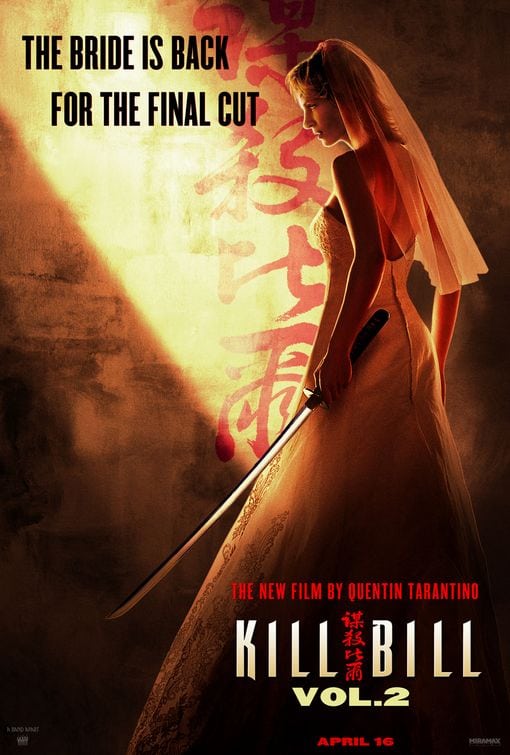
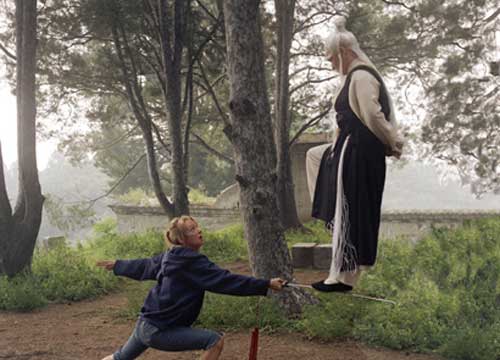
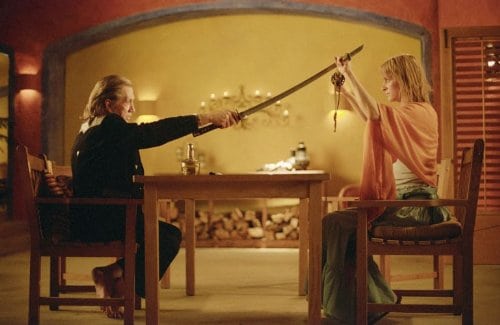




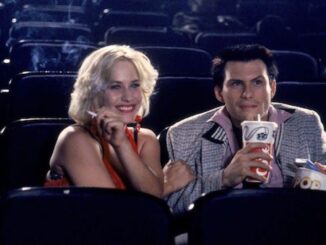
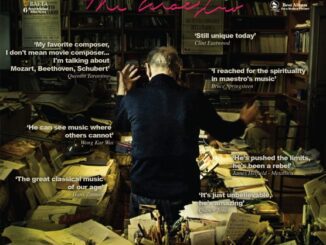
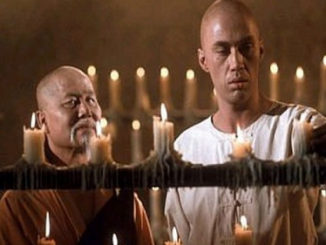
Be the first to comment